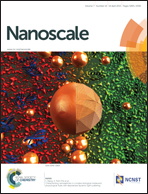“H2 sponge”: pressure as a means for reversible high-capacity hydrogen storage in nanoporous Ca-intercalated covalent organic frameworks†
Abstract
We explore the potential and advantages of Ca-intercalated covalent organic framework-1 (CaCOF-1) as a 3-dimensional (3D) layered material for reversible hydrogen storage. Density functional theory calculations show that by varying the interlayer distance of CaCOF-1, a series of metastable structures can be achieved with the interlayer distance falling in the range of 4.3–4.8 Å. When four hydrogen molecules are adsorbed on each Ca, a high hydrogen uptake of 4.54 wt% can be produced, with the binding energy falling in the ideal range of 0.2–0.6 eV per H2. While H2 absorption is a spontaneous process under H2 rich conditions, tuning the interlayer distance by reasonable external pressure could compress CaCOF-1 to release all of the hydrogen molecules and restore the material to its original state for recyclable use. This provides a new method for gradual, controllable extraction of hydrogen molecules in covalent organic frameworks, satisfying the practical demand for reversible hydrogen storage at ambient temperatures.


 Please wait while we load your content...
Please wait while we load your content...